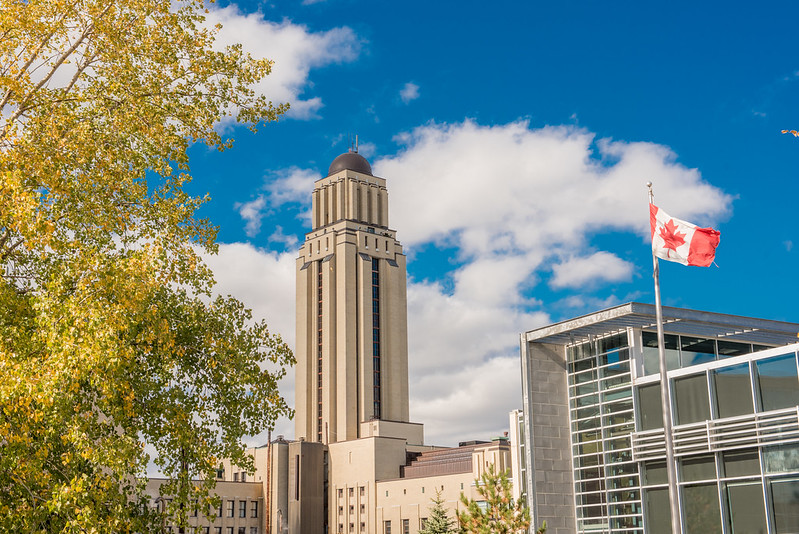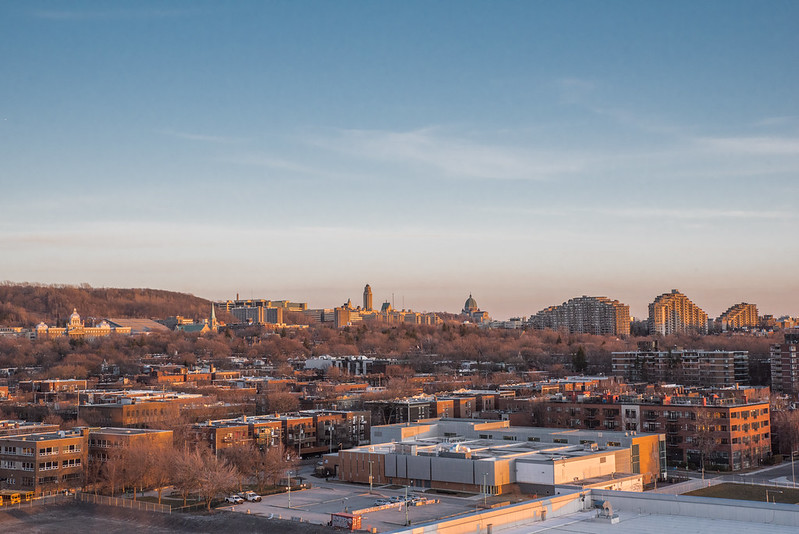Moving to Montreal and working at UdeM
Have you received a job offer from Université de Montréal or are you planning to apply for a job? Does the prospect of moving to Québec interest you? Moving to another country and choosing where exactly you want to live and work is a major decision. Discover all that Montreal has to offer and learn about the immigration procedures that are necessary for you to work at UdeM.
This section is also for UdeM staff members who want to help another person come to work at the university.
Useful link

The immigration process for staff from another country
There are various immigration procedures you will need to undertake to work at UdeM.
Our immigration team can guide you through the process of gathering some of the documents you will need, such as your passport, diplomas, marriage certificate or proof of cohabitation with your partner, and birth certificates if you have children.
Applying for a work permit
Processing times for work permit applications vary depending on the country where the application is processed, and may change at any time.
When you’ve gone through the hiring process, our immigration team will help you apply for a work permit or an exemption, depending on the length of your stay and your employment status at UdeM. You will need to provide various documents.
Formal requirements at the Canadian point of entry
1) To receive your work permit
You will need to wait for your work permit to be approved before travelling to Canada.
Your work permit will be issued by an immigration officer at the Canadian port of entry when you arrive in the country. You will need to provide the officer with:
A valid passport
The approval letter for your work permit
A copy of the supporting documents that you submitted online with your application
When you receive your work permit, make sure that all the information on the document is correct: name, date of birth, nationality, occupation, etc.
2) To obtain a work permit exemption
If you are applying for a work permit exemption, you must submit your application directly to an immigration officer when you arrive in Canada.
Have the following documents ready:
Your application for a work permit exemption provided by UdeM international
A valid passport
A valid entry visa or electronic travel authorization (eTA), depending on your country of citizenship
If you receive remuneration from UdeM, you’ll need to ask the immigration officer to produce a visitor record to confirm that you are authorized to work in Canada. Service Canada will ask for this document in order to issue you a social insurance number.
Applying for a work permit extension
If you are applying for a work permit extension, you must do so before the expiry date of your initial work permit. Work permit extension applications are processed in Canada, and processing times can be long. Our immigration team can help you with the application process.
If you are applying for an extension before your initial work permit expires, you can obtain maintained status, which allows you to continue living and working in Canada while your application for an extension is being processed. If so, you must continue to comply with the work conditions of your initial work permit (job title, salary, benefits, etc.).
If you apply for an extension to change your job position or because of a significant change to the initial conditions of your employment, you will need to wait for the new work permit to be issued before you change your position or conditions of employment.
If you have a work permit exemption, you cannot obtain maintained status. You will therefore have to leave Canada when your work permit is ending and submit a new application from outside the country.
IMPORTANT
Please note that the laws and regulations in force in Québec and Canada concerning immigration, as well as the websites of the Ministère de l’Immigration, de la Francisation et de l’Intégration (MIFI) and Immigration, Refugees and Citizenship Canada (IRCC), take precedence over the information contained on this website.
Also note that the information presented here does not constitute legal advice and is not binding on Université de Montréal or its employees.
Preparing to live in Montreal

If you’re about to arrive in Montreal, here’s some practical information about this beautiful city and the different services offered at UdeM. Discover the city’s neighbourhoods, sports and culture on campus, how to navigate health care and more: all the essentials to make the most of your new professional chapter at UdeM.
Useful link
Finding housing in Montreal
If you want to live near a Metro line that connects you directly to your workplace, the Blue Line goes to Université de Montréal and passes through the neighbourhoods of Villeray and Rosemont–La Petite-Patrie (Fabre, D’Iberville, Jean-Talon and De Castelnau stations), Parc-Extension (Acadie and Parc stations), Outremont (Outremont station), Côte-des-Neiges (Édouard-Montpetit, Université-de-Montréal and Côte-des-Neiges stations) and Saint-Michel (Saint-Michel station).
Discover the neighbourhoods of Montreal
For a short stay
Université de Montréal has studio apartments in student residences that are available to interns and professors.
Hôtel Terrasse Royale, located near the campus, may be another option.
For longer stays (several months)
Visit this page and explore the useful links section to learn about the different options available to you.
Useful links
The Tribunal administratif du logement informs tenants and landlords of their rights and responsibilities related to a lease, promotes conciliation between landlords and tenants and decides on disputes.
The Canada Mortgage and Housing Corporation, Canada’s national housing agency, provides Canadians (including newcomers) with information and tools to help them make informed housing decisions.
Working at UdeM
Tools and resources to start your job at UdeM on the right foot
Taxes
Getting to and around the campus
Discover the Montreal campus
The Université de Montréal podioguide offers you a podcast tour of the campus. It provides an overview of the university’s history and architecture, with important information and interesting comments, analyses and memories from past and present members of the Université de Montréal community.
You can consult the map of the Montreal campus to help you find your way around.
Getting around the Montreal campus
Getting around by Metro
Université de Montréal’s main buildings are accessible by the Metro Blue Line, which runs between Saint-Michel and Snowdon stations.
Consult the map of the campus and the Montreal Metro map to help you find your way around.
For more information on the Metro and bus routes and schedules, visit the Société de transport de Montréal (STM) website.
Prefer biking?
Members of the university community get a special rate on the Bixi bike-sharing service.
Planning to get around by car?
Temporary workers with a temporary residence permit for six to 12 months must have a driver’s licence from their country of origin and an international driver’s licence in order to drive in Montreal (click here for more details).
Montreal has a car-sharing service that has cars available for short trips. Explore the Communauto website to learn more about this great system.
UdeM also has a carpooling platform for members of the university community.
Visit the Sustainable development Unit website to learn more about the green mobility options available on campus.
Discover the eight ways to get from campus to campus >
Getting to other UdeM campuses
Need to get to a campus outside of Montreal? Visit the following links:
Health and well-being
Université de Montréal’s health and well-being program The Employee and family assistance program and the On prend soin de nous program for UdeM staff provides psychological health and support services, virtual tools, tips for stress management and improved sleep, and help with staying fit. It offers a wide range of courses, activities, conferences, group challenges and projects for staff members.
UdeM health clinics
The specialists and trainees at our teaching clinics provide health care to the UdeM community and other Montrealers.
Sports and culture at UdeM
Culture and entertainment
Les Belles Heures
Université de Montréal’s Les Belles Heures presents curated educational talks by fascinating and inspiring individuals who stimulate our curiosity, explore fascinating ideas and delve into cultural concepts. Open to the public, Les Belles Heures helps us see society and current events in a new light.
Galerie UdeM
The Université de Montréal gallery presents interdisciplinary exhibitions and public activities that create encounters between art and science. Combining research and creativity, the gallery’s programming aims to appeal to a wide range of audiences from the UdeM community and beyond.
Film
UdeM’s wonderful film hub, Ciné-Campus, presents affordable screenings of feature-length films, cult movies and documentaries and live talks with artists from the film world. The theatre is open to the public and offers special rates for the student and university community.
Concerts and events at the Faculté de musique
Each year, Université de Montréal’s Faculty of Music presents programming that showcases the university’s student community and teaching staff, along with renowned guests from around the world. The wide-ranging events cover everything from digital music to opera to jazz to world music, and from Baroque to Classical to contemporary music, and are open to the public. Tickets range from free to affordable.
Podcasts from the UdeM community
Many members of the UdeM community are creating compelling and insightful content that’s relevant to our contemporary world. Discover stimulating discussions, hear from public figures and learn more about what inspires and concerns the younger generation.
Watching and playing sports
CEPSUM
CEPSUM, Université de Montréal’s physical education and sports centre, is one of the largest sports complexes in Québec. Located at the foot of Mont Royal, it’s a paradise for physical-activity enthusiasts of all ages and abilities.
Carabins UdeM’s student athletes shine in a range of competitive sports, including football, women's hockey, rugby, soccer and cheerleading. Follow the exciting adventures of the Carabins teams as they strive for victory and aim to make the UdeM community proud, and join in our favourite chant, "Allez les Bleus!"
Discover Montreal and Québec
Moving to a new country, whether for a few months or permanently, is an exciting and challenging adventure. Here are some resources that provide information on different aspects of life in Québec so you can enjoy everything your new home has to offer.
Be sure you take advantage of your stay at UdeM to explore Montreal and other parts of Québec. The following websites can help you discover the top attractions:
The Québec education system
The Québec education system has four levels:
Preschool
Elementary and secondary school, which includes general education and professional training
College, which has two components: pre-university and technical training
University, which comprises undergraduate, master’s and doctoral (first, second and third cycle). Post-doctoral studies are also possible after the doctoral level.
University education
University education is divided into three cycles. The first cycle (undergraduate) leads to a bachelor’s degree after three or four years of full-time study, depending on the field of study. With a bachelor’s degree, students can enter the job market or pursue graduate studies.
One-year certificate programs are also offered at the undergraduate level. If the right conditions are met, three certificates can result in a bachelor’s degree.
The second cycle (master’s) leads to a master’s degree after two years of full-time study and the completion of a thesis or internship.
One-year programs leading to a Diplôme d’études supérieures spécialisées or a graduate certificate can also be taken in the second cycle.
The third cycle prepares students for a career in research. Students can earn a doctorate after completing approximately three years of full-time study and writing a thesis.
An experienced team to help staff with their needs
UdeM international’s immigration advisors guide professors and research and administrative staff through the different administrative steps involved in immigration.
